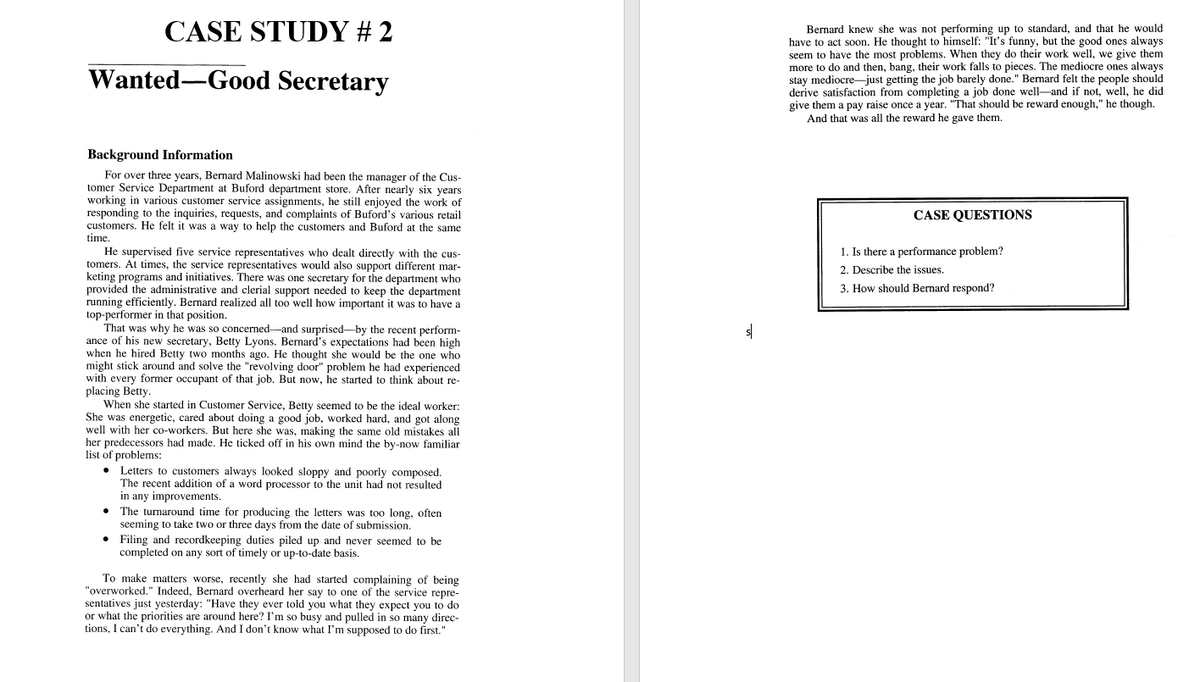CASE QUESTIONS 1. Is there a performance problem? 2. Describe the issues. 3. How should Bernard respond?
CASE QUESTIONS 1. Is there a performance problem? 2. Describe the issues. 3. How should Bernard respond?
Management, Loose-Leaf Version
13th Edition
ISBN:9781305969308
Author:Richard L. Daft
Publisher:Richard L. Daft
Chapter19: Managing Quality And Performance
Section: Chapter Questions
Problem 10DQ
Related questions
Question

Transcribed Image Text:CASE STUDY # 2
Wanted-Good Secretary
Background Information
For over three years, Bernard Malinowski had been the manager of the Cus-
tomer Service Department at Buford department store. After nearly six years
working in various customer service assignments, he still enjoyed the work of
responding to the inquiries, requests, and complaints of Buford's various retail
customers. He felt it was a way to help the customers and Buford at the same
time.
He supervised five service representatives who dealt directly with the cus-
tomers. At times, the service representatives would also support different mar-
keting programs and initiatives. There was one secretary for the department who
provided the administrative and clerial support needed to keep the department
running efficiently. Bernard realized all too well how important it was to have a
top-performer in that position.
That was why he was so concerned-and surprised by the recent perform-
ance of his new secretary, Betty Lyons. Bernard's expectations had been high
when he hired Betty two months ago. He thought she would be the one who
might stick around and solve the "revolving door" problem he had experienced
with every former occupant of that job. But now, he started to think about re-
placing Betty.
When she started in Customer Service, Betty seemed to be the ideal worker:
She was energetic, cared about doing a good job, worked hard, and got along
well with her co-workers. But here she was, making the same old mistakes all
her predecessors had made. He ticked off in his own mind the by-now familiar
list of problems:
• Letters to customers always looked sloppy and poorly composed.
The recent addition of a word processor to the unit had not resulted
in any improvements.
●
The turnaround time for producing the letters was too long, often
seeming to take two or three days from the date of submission.
Filing and recordkeeping duties piled up and never seemed to be
completed on any sort of timely or up-to-date basis.
To make matters worse, recently she had started complaining of being
"overworked." Indeed, Bernard overheard her say to one of the service repre-
sentatives just yesterday: "Have they ever told you what they expect you to do
or what the priorities are around here? I'm so busy and pulled in so many direc-
tions, I can't do everything. And I don't know what I'm supposed to do first."
sl
Bernard knew she was not performing up to standard, and that he would
have to act soon. He thought to himself: "It's funny, but the good ones always
seem to have the most problems. When they do their work well, we give them
more to do and then, bang, their work falls to pieces. The mediocre ones always
stay mediocre just getting the job barely done." Bernard felt the people should
derive satisfaction from completing a job done well-and if not, well, he did
give them a pay raise once a year. "That should be reward enough," he though.
And that was all the reward he gave them.
CASE QUESTIONS
1. Is there a performance problem?
2. Describe the issues.
3. How should Bernard respond?
Expert Solution
This question has been solved!
Explore an expertly crafted, step-by-step solution for a thorough understanding of key concepts.
This is a popular solution!
Trending now
This is a popular solution!
Step by step
Solved in 2 steps

Recommended textbooks for you

Management, Loose-Leaf Version
Management
ISBN:
9781305969308
Author:
Richard L. Daft
Publisher:
South-Western College Pub

Management, Loose-Leaf Version
Management
ISBN:
9781305969308
Author:
Richard L. Daft
Publisher:
South-Western College Pub